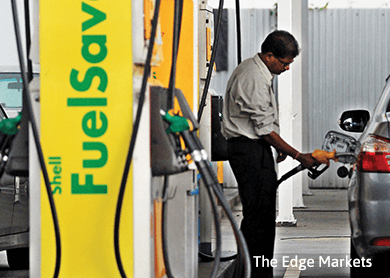
KUALA LUMPUR: The B10 biodiesel programme is expected to be implemented by October this year, Plantation Industries and Commodities Minister Datuk Seri Douglas Uggah Embas said yesterday.
He said the paper on the B10 biodiesel programme is expected to be presented to the Cabinet by the end of June.
“It (B10) will require one million tonnes of CPO (crude palm oil) on an annual basis,” he told a press conference after opening the 8th International Planters Conference 2015 here yesterday.
“We expect to finalise discussions with stakeholders by the end of June, because by then I will present the paper to the Cabinet,” he added.
If the programme takes off in October, it will be the first time Malaysia will implement the B10 programme which sees a blend of 10% of palm methyl ester with 90% petroleum diesel.
Malaysia has implemented a maximum of the B7 biodiesel mandate — a blend of 7% of palm methyl ester with 97% petroleum diesel.
The nationwide mandate was completed in January this year.
Last year the government delayed the implementation of the B5 biodiesel mandate until the end of the year, instead of the original target of July.
According to a Bloomberg report in August last year, the delay was due to 15 blending facilities being constructed in Sabah, Sarawak and Labuan.
Under the 11th Malaysia Plan, the country has a target to implement the B15 mandate by 2020.
In his speech at the opening of the conference, Uggah reiterated that the government aims to increase the oil extraction rate (OER) at palm oil mills to 25% by 2020 from the current 20%, translating into an increase of national palm oil yield from 4 tonnes per hectare per year to 6 tonnes per hectare per year by 2020.
“Based on the planted area of 5.23 million hectares, this will mean the country would be able to produce an additional 10 million tonnes of palm oil annually valued at over RM20 billion without the need for land expansion,” he added.
He said replanting unproductive palms in estates with high yielding palms is expected to contribute to the target of increasing fresh fruit bunch (FFB) yield from 20 tonnes to 26 tonnes per hectare per year.
This is coupled with measures to strengthen enforcement ensuring that quality and ripe FFB are delivered to palm oil mills, he added.
Uggah said the target to increase OER is crucial as the palm oil industry is grappling with the issue of availability of suitable land for oil palm expansion.
He was also bullish on the direction of palm oil prices.
Reuters reported yesterday that Malaysian palm oil futures rose to its highest level in over three months yesterday, and the August palm oil contract on Bursa Malaysia gained 0.4% to RM2,350 a tonne.
The contract was trading in its third straight day of gains, after breaching the RM2,362 threshold, the highest since March 5.
The news agency reported that the three-day rally was supported by a slump in the ringgit to a nine-year low.
The ringgit dove to 3.7710 against the greenback yesterday, its lowest since January 2006 on the back of reinforced expectations of an interest hike by the US Federal Reserve by year-end due to strong employment data released in the United States.
The weak ringgit translates into cheaper palm oil feedstock for overseas purchasers.
This article first appeared in The Edge Financial Daily, on June 9, 2015.